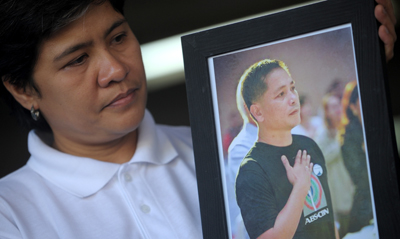The investigation into the notorious murder of muckraking Philippine journalist Marlene Garcia-Esperat in Mindanao is now seven years old. A separate hunt for conspirators in the January 2011 killing of Palawan radio journalist Gerardo Ortega is just getting started. The Regional Trial Court in Puerto Princesa City issued arrest warrants against three suspects in the Ortega case on Tuesday, and one has been arrested, according to the local Center for Media Freedom and Responsibility. But both cases should already have been solved.
Here are some features they share:
- The journalists reported on local corruption.
- They went after high-profile targets: Garcia-Esperat accused two Department of Agriculture officials of misappropriating funds; Ortega highlighted irregularities in mining contracts awarded by the former governor of Palawan province.
- The triggermen who carried out the killings were apprehended.
- Those assailants implicated high-profile figures in masterminding the attacks.
- Arrest warrants have been issued against the masterminds.
- The masterminds are yet to be tried and convicted. And in that sense, these cases are like the 68 other journalist murders that CPJ has documented in the Philippines in the last two decades.
What has gone wrong?
The 2006 conviction of three men who admitted taking money to murder Garcia-Esperat was a landmark achievement in the fight against impunity for journalist killings, and represented 19 months of work for Garcia-Esperat’s family and supporters. Yet the momentum stopped there. The officials they said ordered the hit, Osmeña Montaner and Estrella Sabay, challenged murder charges against them, fended off arrest warrants, and even returned to work in 2010.
The Ortega case also got off to a promising start when police arrested the gunman at the scene, but the investigation into the masterminds he named was dropped. More than a year later, the Department of Justice reviewed new evidence and recommended that the masterminds, including the ex-governor Joel Reyes and his former aide, Romeo Seratubias, be indicted. Puerto Princesa police apprehended Seratubias on Tuesday, according to local and international news reports. Reyes, meanwhile, is still at large.
CPJ has documented 70 journalists murdered for their work in the Philippines since 1992, thirty of them killed in the November 2009 massacre in Maguindanao province. The prosecution of dozens of politically connected suspects in the Maguindanao case has been marked by delays and mired in allegations of bribes and witness intimidation, according to CPJ research.
By now, the Garcia-Esperat case should be heralded for having turned the terrible tide of impunity in journalist slayings. Instead, it is a standing reminder that in the Philippines, it’s just too easy to get away with murder.
